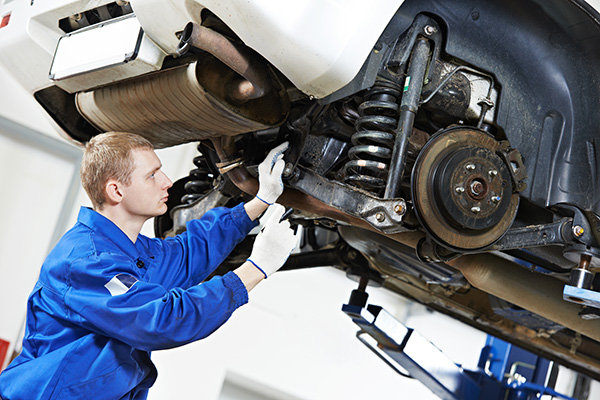
Ever wonder why regular suspension check-ups are essential for keeping your vehicle performing at its best? The suspension system is important for the comfort and safety of your ride. It is responsible for absorbing shocks from road bumps, providing stability, and supporting vehicle control. A healthy suspension system ensures that every drive feels secure and stable. Without regular check-ups, worn suspension components can gradually turn into safety hazards, impact your car’s handling, and lead to costly repairs.
What Role Does the Suspension System Play
The suspension system is much more than just a comfort feature; it’s a network of components working together to absorb the impact from road surfaces and maintain vehicle control. By managing the friction between your tires and the road, the suspension keeps your vehicle steady during turns, quick stops, and unexpected maneuvers. The system includes springs, shocks, struts, and control arms, each with a specific purpose. Over time, each component can wear down due to exposure to rough roads, weather, and regular use.
Worn suspension parts can compromise your vehicle’s control and stability, increasing risks during cornering, braking, and even while driving at steady speeds. When suspension components start to wear out, you might experience longer braking distances, swaying during turns, or even reduced tire traction. Regular check-ups help ensure each component works correctly, maximizing vehicle safety and performance.
Signs Your Suspension Needs Attention
Noticing issues with your suspension often comes down to paying attention to small changes in your vehicle’s behavior. Some of the telltale signs that your suspension system may need an inspection include:
- Pulling to One Side: If your vehicle tends to drift or pull to one side, it may indicate suspension misalignment or damaged components.
- Excessive Bouncing: Does your car keep bouncing after going over a speed bump? This could mean your shocks or struts are worn and need replacing.
- Uneven Tire Wear: Worn suspension can cause uneven tire wear, which not only shortens tire life but also impacts your car’s stability and fuel efficiency.
- Nose-Diving While Braking: If your car “dives” forward while braking, the shocks may no longer be able to support the vehicle’s weight effectively.
By recognizing these signs early, you can address suspension issues before they lead to larger problems or accidents on the road. A regular suspension check-up helps spot potential issues long before they affect your driving.
How Suspension Problems Can Impact Safety
A well-maintained suspension system is essential for vehicle safety. Worn or damaged suspension components make it harder to handle your car, especially in emergencies. For example, during a quick stop, a healthy suspension system helps keep all four tires firmly on the ground, maximizing braking power. However, with worn suspension, the vehicle may tilt forward or feel unstable, increasing the risk of an accident.
A compromised suspension reduces tire traction, which is critical when navigating slick or icy roads. Uneven wear or low-quality suspension parts can decrease the contact between tires and the road, leading to poor handling and longer braking distances. Keeping your suspension in top condition ensures you maintain control over your vehicle in unexpected situations, from slippery surfaces to sudden stops.
The Cost of Ignoring Suspension Maintenance
Suspension issues don’t just impact your car’s safety; they can also affect your wallet. Worn suspension parts, if not replaced, can lead to more extensive repairs down the line. For instance, neglected shocks or struts can lead to uneven tire wear, which means you’ll need new tires sooner than expected. Moreover, prolonged wear on your suspension components may put added stress on the steering system, requiring even more repairs.
Regular suspension check-ups help you avoid these costly repairs by identifying and addressing minor issues before they become major headaches. With routine maintenance, you protect your car’s resale value and ensure you’re not caught off guard by expensive repair bills down the road.
What to Expect in a Suspension Check-Up
A standard suspension check-up involves inspecting each part of the suspension system for signs of wear or damage. Technicians will often start by checking the shocks and struts to see if they’re leaking or showing signs of weakness. The control arms and bushings are also examined to ensure they’re secure and not worn. Additionally, the steering system is checked to make sure it aligns correctly, as suspension and steering work together to keep your vehicle stable.
During the inspection, technicians will also look for any signs of rust or corrosion, especially in areas exposed to road salt or moisture. The suspension check-up gives you a comprehensive look at the system’s health, ensuring your car remains stable, comfortable, and safe on the road.
Don’t let a worn suspension impact your safety! Visit Bexley Automotive today for a thorough suspension inspection. Let us help you maintain control and stability for every mile.